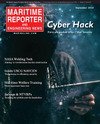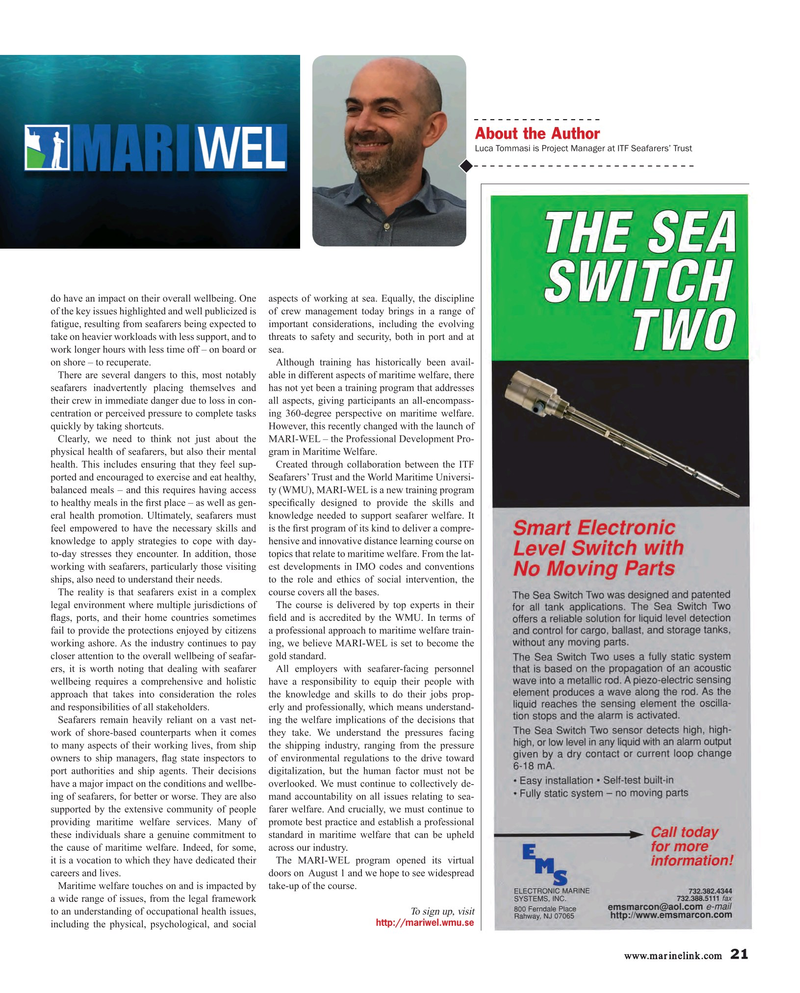
Page 21: of Maritime Reporter Magazine (September 2018)
Maritime Port & Ship Security
Read this page in Pdf, Flash or Html5 edition of September 2018 Maritime Reporter Magazine
About the Author
Luca Tommasi is Project Manager at ITF Seafarers’ Trust do have an impact on their overall wellbeing. One aspects of working at sea. Equally, the discipline of the key issues highlighted and well publicized is of crew management today brings in a range of fatigue, resulting from seafarers being expected to important considerations, including the evolving take on heavier workloads with less support, and to threats to safety and security, both in port and at work longer hours with less time off – on board or sea.
on shore – to recuperate. Although training has historically been avail-
There are several dangers to this, most notably able in different aspects of maritime welfare, there seafarers inadvertently placing themselves and has not yet been a training program that addresses their crew in immediate danger due to loss in con- all aspects, giving participants an all-encompass- centration or perceived pressure to complete tasks ing 360-degree perspective on maritime welfare. quickly by taking shortcuts. However, this recently changed with the launch of
Clearly, we need to think not just about the MARI-WEL – the Professional Development Pro- physical health of seafarers, but also their mental gram in Maritime Welfare. health. This includes ensuring that they feel sup- Created through collaboration between the ITF ported and encouraged to exercise and eat healthy, Seafarers’ Trust and the World Maritime Universi- balanced meals – and this requires having access ty (WMU), MARI-WEL is a new training program to healthy meals in the ? rst place – as well as gen- speci? cally designed to provide the skills and eral health promotion. Ultimately, seafarers must knowledge needed to support seafarer welfare. It feel empowered to have the necessary skills and is the ? rst program of its kind to deliver a compre- knowledge to apply strategies to cope with day- hensive and innovative distance learning course on to-day stresses they encounter. In addition, those topics that relate to maritime welfare. From the lat- working with seafarers, particularly those visiting est developments in IMO codes and conventions ships, also need to understand their needs. to the role and ethics of social intervention, the
The reality is that seafarers exist in a complex course covers all the bases. legal environment where multiple jurisdictions of The course is delivered by top experts in their ? ags, ports, and their home countries sometimes ? eld and is accredited by the WMU. In terms of fail to provide the protections enjoyed by citizens a professional approach to maritime welfare train- working ashore. As the industry continues to pay ing, we believe MARI-WEL is set to become the closer attention to the overall wellbeing of seafar- gold standard. ers, it is worth noting that dealing with seafarer All employers with seafarer-facing personnel wellbeing requires a comprehensive and holistic have a responsibility to equip their people with approach that takes into consideration the roles the knowledge and skills to do their jobs prop- and responsibilities of all stakeholders. erly and professionally, which means understand-
Seafarers remain heavily reliant on a vast net- ing the welfare implications of the decisions that work of shore-based counterparts when it comes they take. We understand the pressures facing to many aspects of their working lives, from ship the shipping industry, ranging from the pressure owners to ship managers, ? ag state inspectors to of environmental regulations to the drive toward port authorities and ship agents. Their decisions digitalization, but the human factor must not be have a major impact on the conditions and wellbe- overlooked. We must continue to collectively de- ing of seafarers, for better or worse. They are also mand accountability on all issues relating to sea- supported by the extensive community of people farer welfare. And crucially, we must continue to providing maritime welfare services. Many of promote best practice and establish a professional these individuals share a genuine commitment to standard in maritime welfare that can be upheld the cause of maritime welfare. Indeed, for some, across our industry. it is a vocation to which they have dedicated their The MARI-WEL program opened its virtual careers and lives. doors on August 1 and we hope to see widespread
Maritime welfare touches on and is impacted by take-up of the course. a wide range of issues, from the legal framework to an understanding of occupational health issues, To sign up, visit http://mariwel.wmu.se including the physical, psychological, and social www.marinelink.com 21
MR #9 (18-25).indd 21 MR #9 (18-25).indd 21 9/5/2018 11:23:11 AM9/5/2018 11:23:11 AM

 20
20

 22
22
